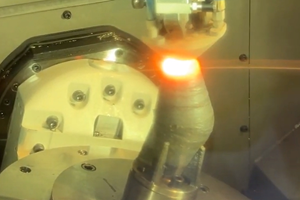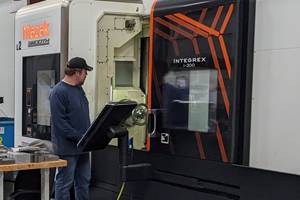In today’s increasingly demanding manufacturing landscape, some companies find out the hard way that staying competitive requires more than just getting the job done.
Having resolved to prevent that from happening to their operation, management at Mile-Hi Machine recently decided to rethink an effective, yet slower, riskier practice that had become routine. Rather than cutting larger parts in stages on smaller machining centers, the shop purchased a larger VMC, a Feeler VMP-1100 from Methods Machine Tools (Sudbury, Massachusetts). In addition to saving production time, the new machine has reduced the risk of error and improved accuracy on the shop’s large-part operations.
Mile-Hi Machine is a precision machine shop in Arvada, Colorado. Founded in 1969 by Mike Szabo, the company had experienced sufficient growth to purchase the building where it was established by 1980. By 1997, the business had doubled in size. Today, Mr. Szabo’s three sons, George, Mike and Denes, run the business. They employ 12 people and report average annual sales of $1.1 million.
The company’s manufacturing facility houses 15 VMCs and five lathes. With customers including Lockheed Martin, Kelly Air Force Base, and Cobe Laboratories, the shop has a steady supply of defense, medical and aerospace work. Sixty percent of this work is in aluminum, 35 percent is in steel, and the rest is in plastic, bronze and brass.
In addition to meeting tight tolerances, the shop’s primary challenges are managing high-mix, low-volume work while delivering the necessary quality and repeatability to adhere to customers’ 100-percent inspection requirements, says George Szabo, company president. For that purpose, it has a full-time inspector, a quality room and systems and a
CMM to provide full traceability, he notes. “Every part is different, and shops face the challenge of managing high-mix, short-run operations where you might be prototyping two or three pieces or cranking out 1,000 parts on any given day.”
Last year, a potential customer approached Mile-Hi Machine to manufacturer a top to a medical cart in ¼-inch aluminum. Measuring 23- by 22-inches, the part was larger than the work envelope of any of the VMCs on the shop floor. In the past, the shop would have machined such a part in stages by continually repositioning it on a VMC worktable as operations proceeded. However, amid an uncertain economy, Mr. Szabo decided that the number of setups and the potential for error associated with this strategy weren’t worth the risk. “I needed a machine with a Y-axis travel of at least 24 inches to do the job efficiently and cost-effectively,” he says.
Mr. Szabo researched a number of machines but found all lacking in quality and reliability. Then he learned about Methods new lineup of Feeler machine tools, one of which turned out to be the right machine for the right price. Manufactured to Methods’ specifications by Fair Friend Group (FFG), these machining centers, turning centers, bridge mills and boring mills feature design and engineering by Methods to meet the needs of the U.S. market.
Mile-Hi Machine had already cultivated a relationship with Methods, so choosing the VMP-1100 on the supplier’s recommendation was an easy decision, Mr. Szabo says. “We have used Methods’ machines for 30 years now,” he explains. “We were confident that if Methods was backing the Feeler machine, we’d get the performance and quality we needed.”
With a 25-hp, 10,000-rpm spindle and X-, Y- and Z-axis travels of 43.3 by 24 by 23.6 inches, the VMC first proved its effectiveness when a customer made an urgent request for a 30- by 18-inch aerospace part. In addition to requiring a very tight tolerance and fast delivery of this part, this was a high-visibility project—the customer wanted to visit during the machining process and spot-check parts.
With the Feeler, Mile-Hi used several tools to cut the whole part in a single setup with fewer operations than the previous process, Mr. Szabo says. Machining time decreased by 25 percent, and accuracy improved. Machining large jobs in fewer setups helps the overall operation run more efficiently. Likewise, less machine idle time has improved productivity. The machine has also proven to be reliable, having run virtually 24/7 since November 2010 with no problems. In fact, the company has added new customers since installing the machine, and business has increased 10 percent, Mr. Szabo says. “We found a great fit wit the Feeler VMP-1100.”





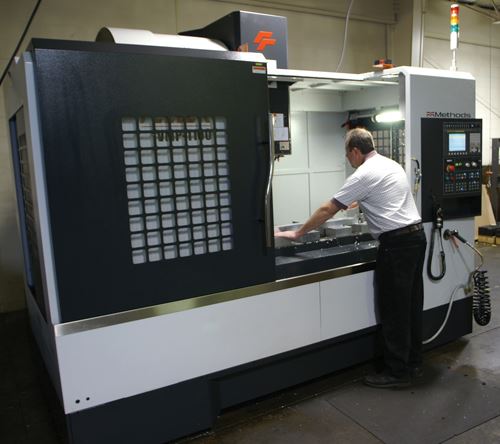
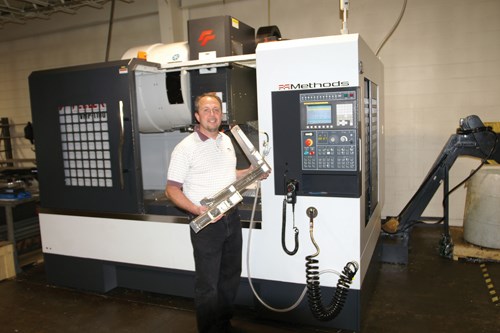
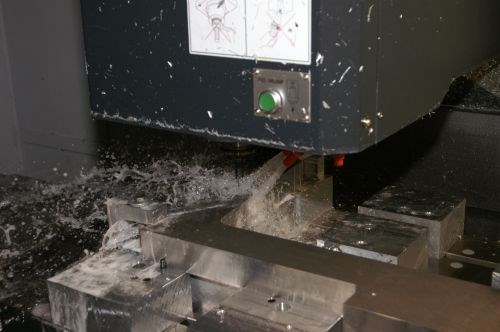
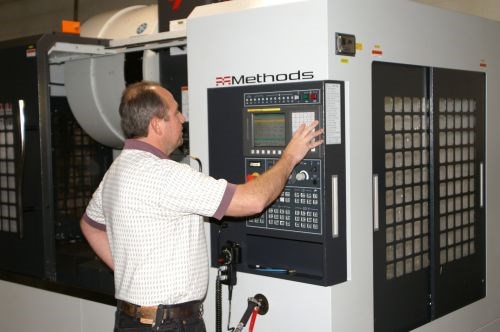




















.jpg;maxWidth=300;quality=90)




